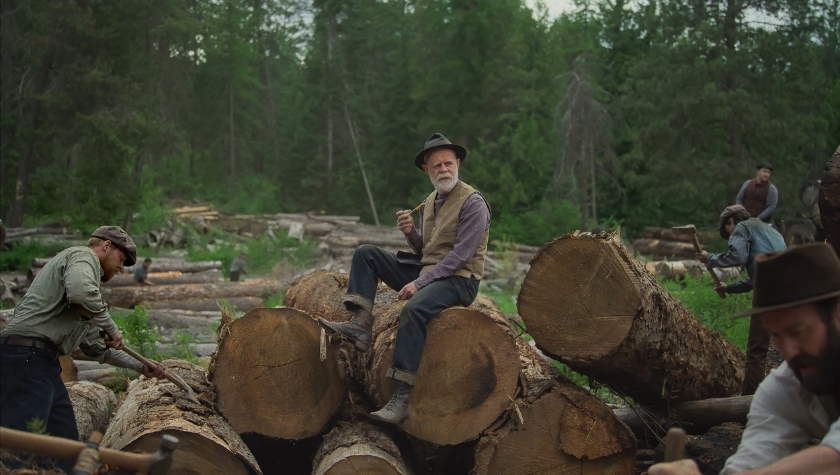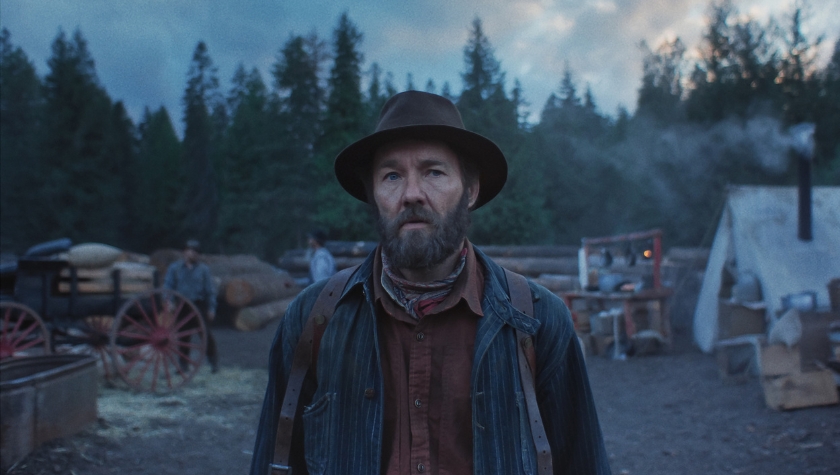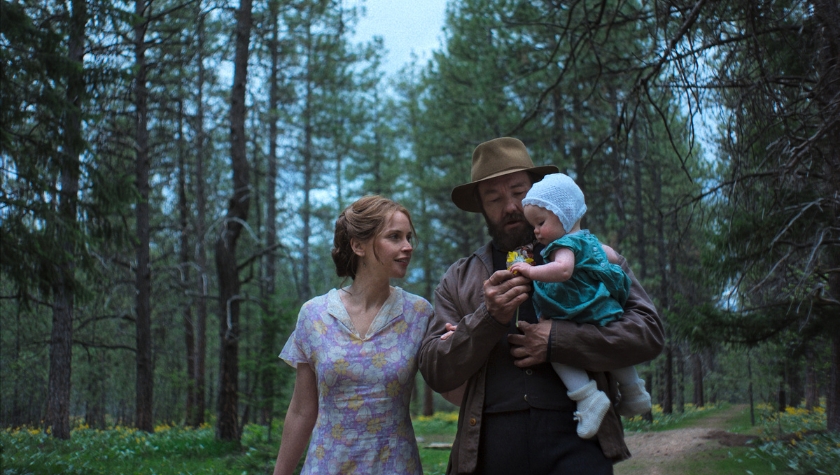Based on Denis Johnson’s acclaimed novella, Train Dreams is the latest film from writer-director Clint Bentley and his longtime writing partner Greg Kwedar, the duo behind Sing Sing (2023).
Set in the Pacific Northwest during the early 20th century, the film follows Robert Grainier (Joel Edgerton), a logger whose quiet life reflects the beauty and brutality of a changing America. Alongside Edgerton, the film stars Felicity Jones, Kerry Condon, and William H. Macy, and paints a deeply human portrait of connection, loss, and resilience amid technological upheaval.
When we spoke with Bentley, his warmth and open-heart made it clear why Train Dreams resonates so deeply. For Bentley and Kwedar, storytelling begins not with genre or plot, but with purpose.
“Early on, we were talking about what animates us as filmmakers,” Bentley says. “I went into this long, rambling thing about characters in a world trying to find each other, and Greg said, ‘Human connection in impossible places.’ Greg’s the master of the catchphrase and that stuck.”
That mission statement continues to guide their collaboration. “The world can be a tough place and we’re all we’ve got,” Bentley adds. “If Sartre said hell is other people, then by that same tack, heaven can be other people as well.”
Balancing Visual Poetry with Narrative Drive
Critics have compared Train Dreams to the films of Terrence Malick for its breathtaking visuals and meditative tone. Yet Bentley’s film maintains a strong sense of narrative propulsion.
“Finding that balance really excites me,” he says. “I love a good long dialogue scene with juicy lines, especially with amazing actors like these. But going back to the roots of cinema, like silent storytelling, there’s something special when a film functions on a level where you don’t need dialogue.”
For Bentley, he enjoys making the most of words and silences. “There’s beauty in a couple waking up together and the sweetness of that moment that needs no words,” he says. “But sitting around a campfire with an old friend, just chatting, is also beautiful. I love doing both and letting the film breathe through that balance.”
Adapting Denis Johnson’s Novella
Transforming Johnson’s slim, stream-of-consciousness book into a feature-length screenplay was no small feat. “The biggest challenge was that the book is so expansive,” Bentley says. “You’re telling 80 or 85 years of this man’s life. We didn’t want it to feel like a cradle-to-grave Wikipedia entry.”
Instead, Bentley focused on finding a cinematic shape for a life that defied traditional film structure. “The book jumps all over a man’s life to give a portrait of him and a portrait of a time,” he says. “We wanted to get that across in a film that had narrative shape without feeling too plot-driven. That was a constant balancing act, and the writing didn’t end in the script, it continued through production and into the edit.”


Escaping the Three-Act Structure
When asked if he followed a conventional three-act structure, Bentley laughs. “I was trying to get away from that! It has like three inciting incidents early on. I thought of it more in terms of a front half and a back half, divided by an event in the middle that changes his life forever.”
In other words, his protagonist Robert has one life before a natural disaster hits, and another life after. The movie is split into two, while memories from the before times repeat and shift in the aftertimes. It’s quite effective storytelling.
Writing an Ordinary Hero
Robert Grainier is not a traditional protagonist. He’s reactive, quiet, and burdened by circumstance. Bentley saw that as an opportunity. “At its heart, it’s a story about a very average person,” he says. “But everybody’s life is an epic journey. Being stuck in traffic and being twenty minutes late to work can be as nerve-racking as any bank heist if your boss is on your ass.”
That sense of everyday grandeur guided Bentley’s approach. “Robert’s not trying to make a million bucks. He’s striving to take care of his family, to rebuild his life,” he says. “We wanted to treat those mundane things with the same depth we feel in our real lives. The first time you realize someone has a crush on you, that’s as electric as robbing a bank.”


The Women Who Shaped the Frontier
Felicity Jones plays Gladys, Robert’s wife, and Kerry Condon plays Claire, a fierce protector of the forest. Both women embody a unique blend of toughness and grace.
“I was raised largely by women – my mother, my grandmother, their friends – and saw them running things while living in a world that told them otherwise,” Bentley says. “I wanted to show that reality through these women.”


When the Movie Gives You Flowers
Bentley smiles when recalling a moment that proved how cinema can transcend the page. “We kept pushing back this scene where Robert and Gladys have their first kiss. It had to be shot on Felicity’s last day and the only place we could think of was shooting it in a field we had seen two weeks before. I was disappointed in the location because I wanted the scene to feel magical,” he says. “Two weeks later, we come back, and the whole field has exploded with yellow flowers. It was more magical than anything we could’ve planned or afforded to do. It was a gift from the movie gods.”
Advice for Screenwriting
When asked what advice he has for screenwriters, Bentley says it all goes back to clarifying the story you want to tell.
“Even before you start writing, try to articulate the story you’re telling,” he says. “Is it an ensemble piece about a music festival in Nashville? A heist film? If you can name what it is, you’ll have a framework for solving problems later.”
He also recalls an insight from writer-director Paul Schrader (Taxi Driver, First Reformed). “He said screenwriting comes from the oral tradition, not the written one. By that he means it’s closer to oral storytelling in terms of working out the kinks of it. And that opened up my mind a lot in terms of when you’re working out something, buy a friend a beer or a coffee and tell them your story. You’ll find out fast where you stumble or lose their attention. That’s true whether you’re telling War and Peace or a rom-com.”
Bentley also encourages writers to embrace what makes them unique. “Do something different. Mix up the form. Lean into what’s specific about you,” he says. “Whatever feels weird or lacking about you, lean into that. That’s what will make your work special. What are you giving the audience? How can you surprise them? We’re in show business at the end of the day.”
Train Dreams streams on Netflix Nov. 21.

